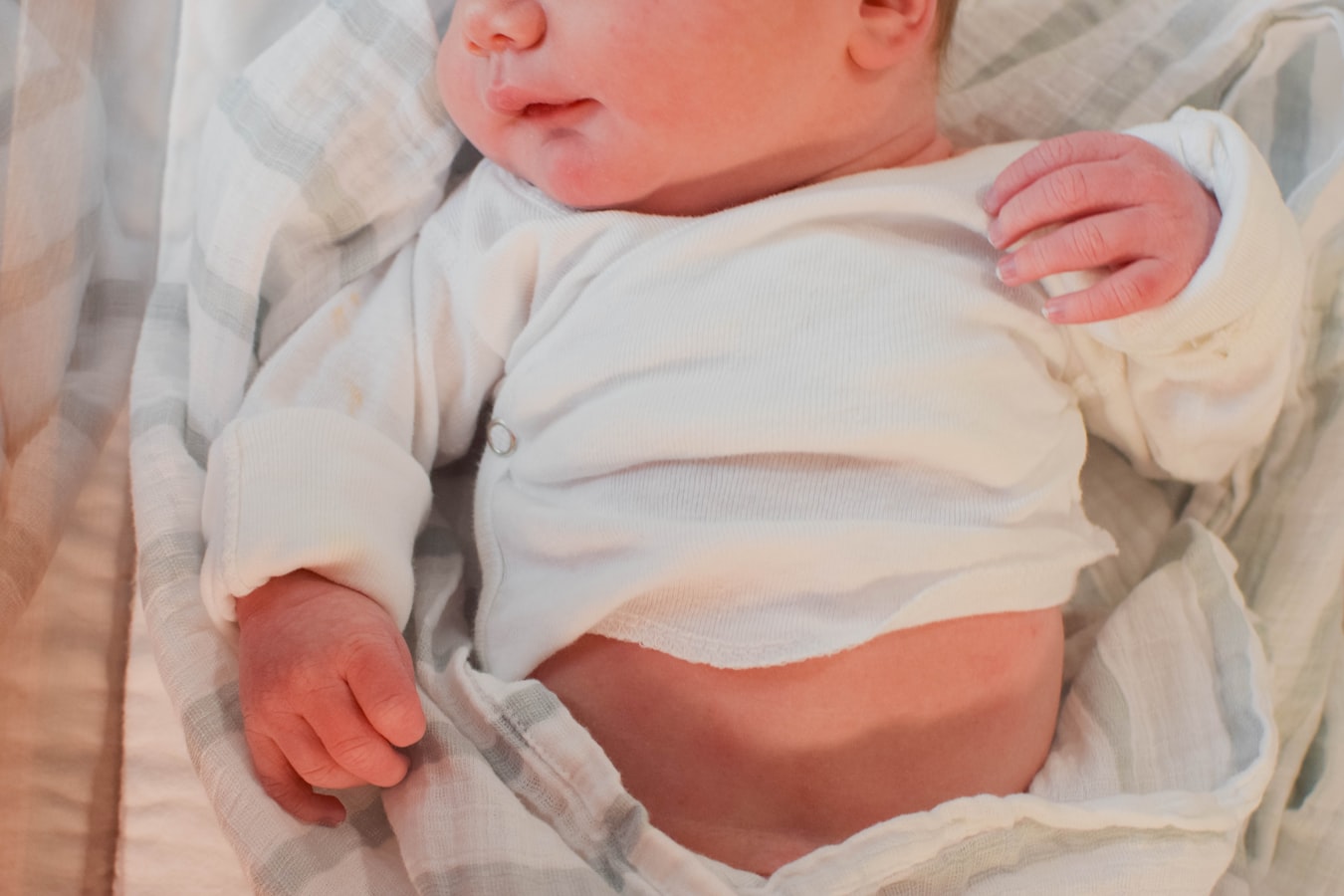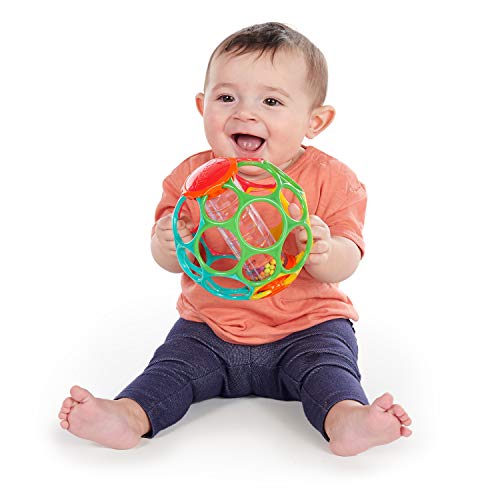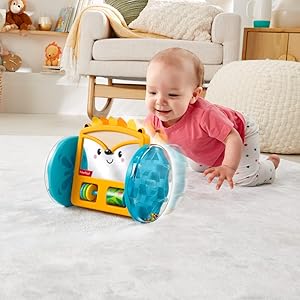When your little one starts reaching other milestones, you start wondering when babies crawl and how they go from being adorable rugrats to mobile tornadoes. In this post, we cover all the basics of baby crawling and how to help baby when they need it and step back and let them take their time too.
Guide to this post
- How babies learn to crawl
- When do babies crawl?
- How to help babies crawl
- Recommended toys for frustrated babies trying to crawl
- When to consult your pediatrician
Interested in Important Baby Milestones? We have a comprehensive post on baby’s first year.
How babies learn to crawl
When your baby starts feeling ready to crawl, they’ll start showing signs that their next milestone is coming real soon. For some babies, this comes really early, which can make other moms and dads nervous. Not to worry, the start-time for crawling varies widely (like, months!) so chances are your baby will crawl when they’re ready.
First off, your baby has to learn how to get on their tummy from a face-up position all on their own.
Rolling over will then lead to a few other strength skills that will have your baby crawling in no time.

Rolling Over Safety Tips
Rolling over may start a long time before crawling, but there are still safety actions to take into account as soon as you see your baby start to turn over.
You can start by baby proofing and keeping dangerous things from their reach as now they’re much less static. This can also mean keeping plush toys away from their crib when they’re napping. Nothing is too far away now!
While you’re changing them, you can use a couple of methods to make sure they don’t roll off the changing table and onto the floor. First, keep one hand on their belly with a small amount of pressure to hold them steady while you grab other supplies with your other hand or turn away to look for things. Second, use a secure harness to keep them there if for any reason you need to take your hands off of them.
We’d recommend the former method more. Even if they haven’t started twisting and rolling, nothing is stopping them from trying while on the changing table.
Furthermore, you can get a smart baby monitor with rollover alerts sent directly to your phone to make sure that their rolling over keeps them moving towards their milestones while staying safe.

When do babies crawl?
This baby milestone starts between month 6 and 10 and it doesn’t always look the same. While your baby might take their time to actually crawl, stimulating them to start early could be a good idea. Some physicians showed that babies that start crawling early become stronger at motor and sensory skills later in life, but those results aren’t conclusive.
So while the fruits of your crawling-exercise efforts are going to vary, it’s still important to stimulate your little one toward making the move.
Signs that baby is ready to crawl
Of course, your little bundle of joy doesn’t just wake up one day and crawl. So what are the tell-tale signs that your baby is ready to crawl?
The stages of crawling include
- Alternating sides to rest on
- Scooting backward
- Scooting forward
- Moving forward with just the lower body (could lead to face plant)
- Moving forward with only the upper body
Looking for some stages of crawling pictures? How about a video of a baby in action going from total newbie to a crawling pro.
How to help babies crawl
There are lots of steps you can take to make crawling more accessible to your baby. In fact, there are even exercises to help baby crawl!
Crawling exercises
- Tummy time: In order to get strong enough to crawl, baby will have to strengthen their upper body. Namely, their shoulders back and neck to lift themselves up.
- Lift your baby’s hips and place their knees together on the ground below him. This will encourage them to hold their weight on their hands or forearms to strengthen.
- Your palms on baby’s feet: let your baby use your palms to push off once they’re scooting forward.
- Use toys! Exercise doesn’t have to be a miserable thing. Keep your baby engaged and excited about tummy time by using their favorite toys and bring some new developmental toys into the mix too.
The best surface for baby to learn to crawl
Though many parents use a blanket, these can bunch up and cause more trouble for your baby in their already difficult task. Some parents suggest buying a small rug, big enough for their learning stage, the first few months. Of course, as soon as your baby gets
What to avoid during the crawling stage
Walkers
While your baby is just beginning to explore the possibilities of crawling, try not to put them on a walker. They can keep your baby from working out those muscles they need, keeping them from crawling for longer.
Overusing car seats and baby carriers
The car seat should really be a place to stay while they’re in the car. Sleeping in it outside the car or keeping them in it can be unsafe for their sleep and hinder them in development. While wearing your baby is a great way of keeping them calm while having your hands free, once they’re preparing to crawl, you’re better off setting them in a designated area, baby proofing around them, and then letting them scoot, push, and eventually crawl around instead.
Getting impatient
Let your baby take their time. Some babies don’t crawl at all and go straight to walking, others just wait longer to take the leap. Pushing your baby to start when they’re not ready won’t help. Keep them exercising and getting stronger, but if they just don’t, keep waiting. After all, you’re going to miss the time they were this still.
Recommended toys for frustrated babies trying to crawl
If your baby wants to crawl, but just keeps getting frustrated and upset during tummy time using toys can help. It’ll basically distract them from the fact that they’re doing work and keep the mood playful and fun.
Tunnels
Not so much a toy, but definitely meant for playing, tunnels are a simple way of encouraging your baby to crawl from one end to the other. This, paired with a mobile toy like a ball can stimulate your baby to chase and move towards the other end. This might be for after your baby has already started crawling, but it can have a big effect on their motivation to do so!
You can find tunnels at many stores including IKEA and there are plenty to choose from on Amazon.
Activity Tables

While tunnels will help with overall mobility, activity tables help with coordination, balance, lower body strength and more. All of this while stimulating your baby’s cognitive development. You can find a lot of these at toy stores and, of course, Amazon.
O-Ball

This type of simple O-ball is amazing for little ones to chase. It has a rainstick in the middle which makes rain sounds to draw your baby to chase it, the holes allow babies to grip it easily, it rolls at a moderate speed on most surfaces. Clearly, we’re not the only ones who like it because it has about 1500 reviews and an average rating of 4.8 stars.
Fisher-Price Play & Crawl Hedgehog Mirror

Mirrors are a great motivator for babies because they’re shiny and bright. Then once they approach, they see themselves! What a treat! Mirrors can not just increase your baby’s ability to focus, they can also call them to crawl and later walk.
That’s why this mirror roll-along toy from Fisher-Price is great for moving your infant from tummy time to a full crawl. It offers sensory stimulation with a clacker bead bar and Hedgehog “quills”.
Crawl Along Musical Unicorn
This Fisher-Price rolling unicorn is made for your baby to reach for and bat at. It also has a mirror for tummy time and plays music for your baby to work their little muscles out to.
Cat on a Vac

If a ball isn’t quite doing it for your baby, Fisher-Price also offers this crawl-along cat toy. It basically looks like a little cat sitting on a Roomba, which is pretty cute. Push down the cat’s head and it goes along the floor playing vacuum sounds, flashing lights, and playing music.
On top of developing your baby’s motor skills, this toy also teaches them basic phrases, counting, and concepts like daily routines and friendship.
When to consult your pediatrician
You can always consult your pediatrician if you feel like your baby needs help crawling or if you see some unusual behavior. They’re experts that are there to help you as much as they help your baby.
Parents.com recommends that you “contact your pediatrician if by 3 to 6 months, your child isn’t wriggling her legs, seems to flop in your arms, or she doesn’t put her feet down when you try to support her in a standing position.”
Keep Browsing
- How to Track Your Baby’s Growth: Understanding Height and Weight Development

- Tiny Hands, Big Bites: A Complete Guide to Baby-Led Weaning (BLW)

- Essential Guide to Solid Foods for Baby’s Growth

- Soothe the Scratch! Easing Your Child’s Atopic Dermatitis

- Managing Your Child’s Fever: Simple Tips from a Pediatrician

- How Much Sleep Does Your Baby Actually Need?
